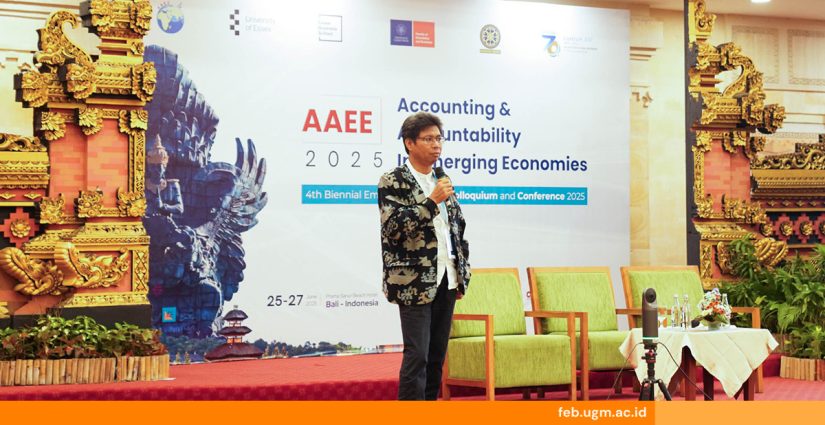
Earnings management remains a critical issue in corporate governance, particularly in developing countries where supervisory systems are not yet fully robust. Professor Mahfud Solihin, Ph.D., Professor of Accounting at FEB UGM, stated that companies often regard high managerial ability as a valuable asset. However, managers with high capabilities also have the potential to engage in earnings management, especially in environments with weak oversight and lax enforcement of ethical standards.
This fact is one of the findings from a study conducted by Mahfud, Dr. Puspita Ghaniy Anggraini, and Singgih Wijayana (PhD), who are faculty members in the Department of Accounting at the Faculty of Economics and Business (FEB) at UGM. The research, titled “Managerial Ability, Sustainability-Ethics, and Earnings Management: Evidence from Indonesia,” was presented at the 4th Biennial Emerging Scholars Colloquium and Conference on Accounting and Accountability in Emerging Economies (AAEE) held at Sanur Prama Sanur Beach Hotel, Bali, on June 27, 2025.
Mahfud explained that this study was motivated by previous findings from companies in the United States, which indicated that managers with high ability tend to produce higher-quality financial reports and avoid earnings manipulation. However, in countries with weak governance structures like Indonesia, these capabilities may be exploited for earnings management due to the opportunities and incentives for such behavior. Weak law enforcement, a collectivist culture, and high levels of corruption are also significant factors considered in the analysis.
Mahfud said the study tested three main hypotheses. Firstly, we will consider whether managerial ability is related to earnings management practices. Secondly, we will consider whether companies with strong sustainability and ethical values are less likely to engage in earnings management. Thirdly, we will consider whether a combination of capable managers and companies with strong moral standards can reduce earnings management practices.
The research data covered all publicly listed companies on the Indonesia Stock Exchange, excluding those in the financial, property, and utility sectors, from 2003 to 2019. Variables used included accrual-based earnings management (ABEM), managerial ability (using the MA score), sustainability ethics (using the ESG score), and several control variables such as leverage, losses, firm size, sales growth, firm age, operating cycle, and debt issuance.
“The results show that higher-ability managers are more likely to engage in accrual-based earnings management,” Mahfud explained.
On the other hand, sustainability ethics did not significantly correlate with the reduction of earnings management practices. However, when companies with strong sustainability and ethical values employed capable managers, earnings management practices tended to decrease.
Mahfud added that sustainability ethics influence real earnings management (REM) practices, but their significance is weak. Meanwhile, managerial ability plays a role in preventing REM practices, mainly because the costs and risks associated with REM are higher. Another interesting finding is the interaction between managerial ability (MA) and sustainability ethics, which shows that their combination effectively reduces REM practices.
Mahfud concluded that managerial ability does not automatically have a positive impact in developing countries like Indonesia. Such ability can be used opportunistically in a weak institutional environment. Nonetheless, strong ethical and sustainability values within a company still play an essential role in limiting manipulative practices, particularly when competent managers internalize these values.
Report: Orie Priscylla Mapeda Lumalan
Editor: Kurnia Ekaptiningrum
Sustainable Development Goals









